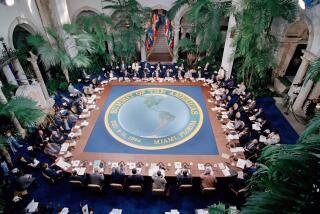French-Speaking Nations Decide Against Commonwealth-Style Ties
- Share via
PARIS — The first summit conference of French-speaking countries ended Wednesday without the creation of a French commonwealth of nations, but President Francois Mitterrand of France nevertheless hailed the meeting as proof of a revival of French culture and language.
Using a word coined in the 19th Century to describe an international community based on French culture and language, Mitterrand said, “ Francophonie has come out of its long sleep. The Renaissance is here.”
Several leaders, most notably Prime Minister Brian Mulroney of Canada, had proposed a formal organization of French-speaking countries somewhat--though not exactly--patterned after the Commonwealth, an organization of British-affiliated states with a secretariat and a secretary general. But the leaders and representatives of the 41 countries and communities at the meeting would not go this far.
But the summit did decide to set up a small committee to monitor the implementation of the various technical agreements reached at the conference and to prepare for a second summit in Quebec City in the fall of next year.
Asked about the proposals for a French commonwealth, Mitterrand told a news conference, “I’m not sure that the British Commonwealth and our French community are comparable. In any case, we are not trying to imitate the Commonwealth. Some leaders have publicly advocated something similar. But we really did not deliberate about it at this meeting. The important thing is that we have tightened our ties.”
This first summit conference had been proposed more than 20 years ago by former President Leopold Senghor of Senegal, but the idea foundered on the Canadian government’s refusal to permit the province of Quebec to attend as a separate delegation. With separatists no longer in control of Quebec and the strong-willed Pierre Elliott Trudeau no longer prime minister, a compromise was finally worked out, allowing Canadian participation in the summit.
Under the compromise, Premier Robert Bourassa of Quebec was permitted to lead a separate delegation so long as he promised to say nothing on international political issues and to request permission of the Canadian prime minister before speaking out on international economic issues.
There were some bruised feelings during the meeting, however, over allegations that Bourassa had broken the agreement by speaking out on world economic issues at one closed meeting without consulting Mulroney. The prime minister later insisted that Canadian news reports about the incident had been exaggerated.
Key Role of Canada
This Canadian-Quebec incident reflected the key role played at the conference by the Canadians. Quebec has the largest French-speaking community in the world outside France, and Canada is the second-largest industrial power that uses French as one of its official languages.
The opportunity to align itself firmly with other French-speaking governments was obviously of great significance to both the Canadian and Quebec governments. Almost 90 Canadian journalists, perhaps a third of the total here, covered the conference, and news briefings by Canadian and Quebec delegates sometimes overshadowed those by the French delegates.
Bourassa, who prepared the final report summing up the work of the conference, said that the delegates, who included 14 chiefs of state and nine chiefs of national governments, had decided against creating a new organization because they felt it made more sense to use those already in existence.
The most notable is the Agency for Cultural and Technical Cooperation, which concentrates on developing programs in education, culture, science and technology among French-speaking countries. France and Canada contribute heavily to finance this agency.
More to Read
Sign up for Essential California
The most important California stories and recommendations in your inbox every morning.
You may occasionally receive promotional content from the Los Angeles Times.












